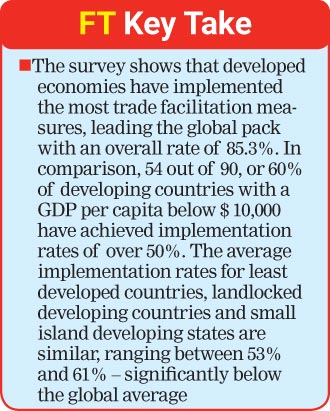Monday Feb 16, 2026
Monday Feb 16, 2026
Wednesday, 27 September 2023 09:54 - - {{hitsCtrl.values.hits}}

Cross-border paperless trade helps reduce transaction time and costs, increases regulatory compliance and promotes direct engagement of small and medium-sized enterprises
|
 Despite geopolitical tensions and supply chain disruptions, countries continue to improve the trading environment by simplifying and digitalising trade processes.
Despite geopolitical tensions and supply chain disruptions, countries continue to improve the trading environment by simplifying and digitalising trade processes.
According to the UN’s fifth global survey on digital and sustainable trade facilitation, an average of 68.6% – up by 6% since 2021 – of the general and digital trade facilitation measures outlined in the landmark Trade Facilitation Agreement of the World Trade Organization (WTO) have been implemented by countries worldwide.
The survey analysed trade facilitation progress across 161 countries worldwide, as outlined in the “Digital and sustainable trade facilitation: Global report 2023” launched on 15 September.
It covers some 60 trade facilitation measures grouped under 11 categories.
These include transparency, formalities, institutional arrangement and cooperation, transit facilitation, cross-border paperless trade, trade facilitation for small and medium-sized enterprises (SMEs), agricultural trade facilitation, women in trade facilitation, trade finance and trade facilitation in times of crisis.
UNCTAD as a new partner
The biennial survey used to be conducted jointly by the UN’s five regional economic commissions.
UNCTAD, which contributed to past surveys, is now part of the core team of organisations conducting the survey.
Leveraging its network of national trade facilitation committees (NTFCs), UNCTAD has provided data from an additional 24 developing nations, including four least developed countries, for the 2023 survey.
“This new partnership significantly broadens the scope of the survey and strengthens its credibility as a comprehensive analysis of digital and sustainable trade facilitation measures,” said UNCTAD Director of Technology and Logistics Shamika N. Sirimanne.
How countries and categories fare
The survey shows that developed economies have implemented the most trade facilitation measures, leading the global pack with an overall rate of 85.3%.
In comparison, 54 out of 90, or 60% of developing countries with a GDP per capita below $10,000 have achieved implementation rates of over 50%.
The average implementation rates for least developed countries, landlocked developing countries and small island developing states are similar, ranging between 53% and 61% – significantly below the global average.
This is in part due to persisting challenges related to weaker digital infrastructure and a lack of adequate legal framework to support cross-border data and documents exchanges.
The results reaffirm the need to step up technical assistance and capacity-building efforts to help these vulnerable economies bridge the existing implementation gap in trade facilitation.
On the different categories of measures, countries scored highest in efforts to enhance transparency, with an implementation rate of nearly 80%.
With digitalisation on the rise, paperless trade has improved the most over the past two years, averaging globally at 68.8%.
Despite the low adoption of cross-border paperless trade measures, pegged at a global average of 45.43%, the survey highlights substantial improvements in areas such as e-transaction laws and electronic exchange of sanitary and phytosanitary certificates.
Need to shore up support for vulnerable groups
The survey also makes a case for more sustainable trade facilitation measures benefiting SMEs, agricultural sector entities and women traders.
Globally, SMEs on average have implemented 43.33% of trade facilitation measures. The average rate for agricultural entities is about 64%.
Meanwhile, reducing gender inequalities remains a challenge, as the global average implementation rate continues to hover below 40% for measures related to women in trade facilitation.
UNCTAD has called for greater SME participation in NTFCs, as well as access to one-stop, electronic “single window” platforms for trade-related information and procedures.
It also urged greater involvement of women in trade facilitation policymaking, for instance, by introducing gender focal points in national trade ministries, increasing women’s representation in NTFCs and creating programs to support female traders.
“By placing an emphasis on inclusive policies, embracing digitalisation and fostering stronger international collaboration, we can establish a trade landscape that benefits everyone and leaves no one behind,” Sirimanne concluded.